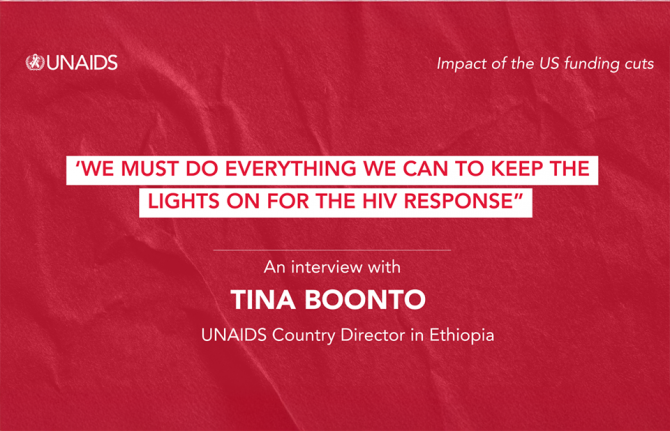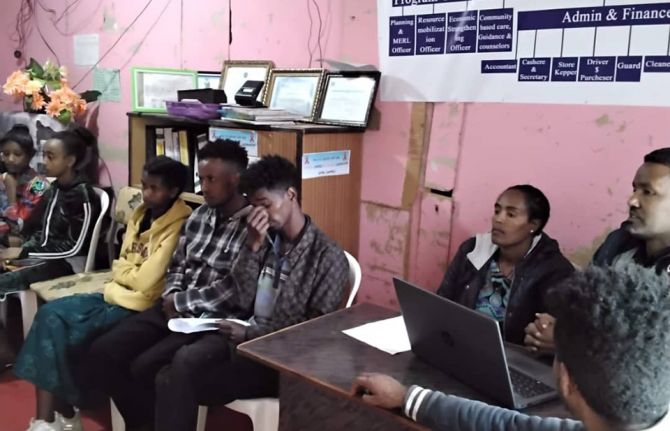
Feature Story
First Lady of Ethiopia commits to elimination of new HIV infections among children
07 December 2011
07 December 2011 07 December 2011
First lady of Ethiopia, Wzro Azeb Mesfin with Michel Sidibé, UNAIDS Executive Director.
Credit: UNAIDS/P.Wiggers
In a meeting at the Presidential Palace in Addis Ababa on 5 December, Mr Sidibé congratulated the First Lady of Ethiopia on her successful stewardship of the Organization of African First Ladies Against HIV/AIDS (OAFLA) and urged her to continue to champion the health and well-being of women and girls across Africa.
“We are counting on you to remain fully engaged in the HIV response,” said Michel Sidibé, UNAIDS Executive Director. “We hope that you will continue to call for the elimination of new HIV infections among children, and that you will continue your conversations with community and traditional leaders around difficult cultural issues.”
As Chair of OAFLA from June 2008 to June 2011, First Lady Wzro Azeb Mesfin was a staunch advocate for the elimination of new HIV infections among children and spoke out against harmful cultural practices, among other issues. She currently serves as a member of the Ethiopian Parliament, a Board Chairperson of the National Coalition for Women Against HIV/AIDS and President of the Ethiopian Women's Federation.
During his meeting with the First Lady, Mr Sidibé emphasized the critical link between AIDS and the wider health and development agenda. “It is important that we take AIDS out of isolation—OAFLA must continue to build a bridge between AIDS and maternal mortality, young people, violence against women and other issues,” Mr Sidibé said.
We hope that you will continue to call for the elimination of new HIV infections among children, and that you will continue your conversations with community and traditional leaders around difficult cultural issues
Michel Sidibé, UNAIDS Executive Director
The First Lady noted that preventing new HIV infections among children has become an increasingly visible issue in Ethiopia. “PMTCT is now on the national health and development agenda on a near-daily basis.” She added that later this month in Addis Ababa, PMTCT will be widely discussed at a conference focused on women’s leadership attended by Members of Parliament, Ministers and representatives of women’s associations across the country.
According to government estimates, there were 1445 health facilities in Ethiopia in 2010-11 providing services that prevent new HIV infections in children, up from just 32 facilities in 2003-04. However, only about 9.3% of the estimated pregnant women in need of PMTCT services nationwide are currently receiving them. Globally, an estimated 390 000 children were born with HIV in 2010—mainly in sub-Saharan Africa.
Mr Sidibé’s meeting with the First Lady was held alongside the International Conference on AIDS and STIs in Africa (ICASA)—a gathering of 7000 AIDS experts focused on the HIV epidemic and response across the African continent.
African First Ladies at ICASA
Later in the day, several African First Ladies gathered at ICASA for a panel session entitled “Towards an HIV-Free Generation.” The First Ladies were joined in the session by Ministers from Ethiopia, Rwanda and Chad, as well as Ambassador Eric Goosby and Bience Gawanas, the African Union Commissioner for Social Affairs.
Members of OAFLA who took part in the session called for greater male involvement in campaigns to end new HIV infections among children. “An HIV-free generation tomorrow needs both caring men and women today, and the work of OAFLA will reflect this,” said the newly elected Chair of OAFLA, H.E. Pohamba Penehupifo of Namibia.
The overarching message in the session was that the AIDS response requires concerted efforts from all stakeholders, including home-grown solutions to the current economic crisis. The First Lady of Namibia expressed the need for OAFLA to focus on raising resources beyond traditional funders.



